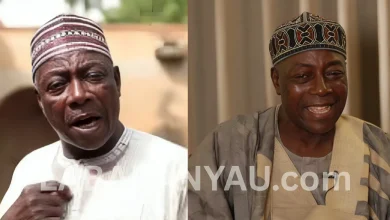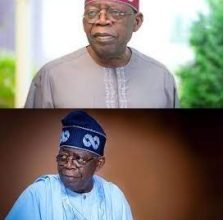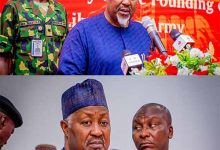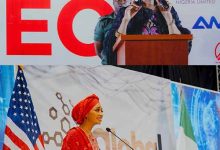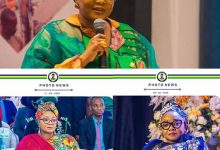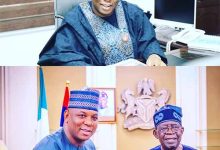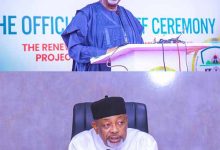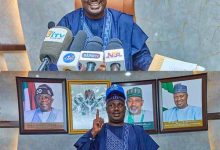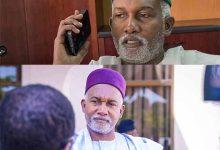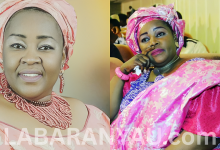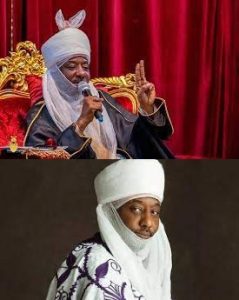
Sanusi Lamido Sanusi Biography
Sanusi Lamido Sanusi, CON (Ajami: سنوسي لاميطو سنوسي, Muhammadu Sanusi na biyu; born 31 July 1961), known by the religious title Khalifa Sanusi II (Ajami: خليفة السنوسي), is a current Emir of Kano State and a spiritual leader in Nigeria’s Tijanniyah Sufi order.
He is a Dabo family member and the 14th Sarki (emir) of Kano, a historic city-state.
He was born in Kano in 1961 into the royal dynasty as Muhammadu Sanusi I’s grandson.
On June 8, 2014, he succeeded his great-uncle Ado Bayero to the throne as Muhammadu Sanusi II, becoming Kano’s 14th Emir.
As the 14th Emir (Sarki) of the ancient city-state of Kano, he spent most of his reign advocating for cultural reform in northern Nigeria.
In 2020, he was deposed by Governor Abdullahi Umar Ganduje and succeeded by Aminu Ado Bayero. On May 23, 2024, Governor Abba Kabir Yusuf restored him to the throne, making him the 16th and current emir of Kano.
Sanusi is an important traditional and religious figure in West Africa. As the Khalifa of Nigeria’s Tijaniyyah Sufi order and neighboring nations, he potentially wields political and spiritual power over the world’s second-largest Sufi organization, which has over 50 million followers.
He grew up in his granduncle’s royal palace, where he got both religious and secular education. Before his accession, Sanusi was an Islamic philosopher, academic, political economist, and banker.
He served as the Governor of the Central Bank of Nigeria from 2009 to 2014, bringing in banking reforms until his suspension after exposing the $20 billion oil crisis.
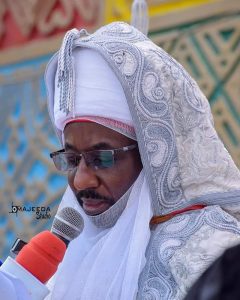
Emir of Kano | |||||||||
|---|---|---|---|---|---|---|---|---|---|
| Reign | 23 May 2024 – present | ||||||||
| Predecessor | Aminu Ado Bayero | ||||||||
| Reign | 8 June 2014 – 9 March 2020 (deposed) | ||||||||
| Coronation | 7 February 2015 | ||||||||
| Predecessor | Ado Bayero | ||||||||
| Successor | Aminu Ado Bayero | ||||||||
| Born | 31 July 1961 Kano, Nigeria | ||||||||
| Spouse | List | ||||||||
| Issue | List | ||||||||
| |||||||||
| House | Dabo | ||||||||
| Father | Aminu Sanusi, Chiroman Kano | ||||||||
| Mother | Saudatu Hussain | ||||||||
| Religion | Sunni Islam | ||||||||
| Governor of the Central Bank of Nigeria | |||||||||
| In office 3 June 2009 – 20 February 2014 | |||||||||
| President | Umaru Yar’Adua Goodluck Jonathan | ||||||||
| Preceded by | Charles Soludo | ||||||||
| Succeeded by | Sarah Alade (acting) | ||||||||
Sanusi Lamido Sanusi Family
Sanusi was born on July 31, 1961, in Kano, to a ruling-class Fulani family from the Sullubawa clan.
He grew up in the palace of his great-uncle, Ado Bayero, who ruled for nearly five decades.
His father, Aminu Sanusi, was a prince and diplomat who served as ambassador to Belgium, China, and Canada before becoming permanent secretary of the Ministry of Foreign Affairs.
He was also the Chiroma of Kano, son of Muhammadu Sanusi I, who was the 11th Fulani Emir of Kano from 1953 to 1963 when he was ousted by his cousin Sir Ahmadu Bello.
Sanusi Lamido Sanusi Education
Sanusi received his early religious education at home, including the Qur’an, hadith, and Muhammad’s traditions.
He then attended St. Annes Primary School, a Catholic boarding school in Kaduna, before enrolling in King’s College in Lagos from 1973 to 1977.
He earned a bachelor’s degree in economics from Ahmadu Bello University in 1981. After graduation, he completed his National Youth Service by teaching at a ladies’ boarding school in Yola for a year.
He returned to the university, where he got a master’s degree in Economics in 1983, and lectured at the faculty for two years.
Sanusi later relocated to Khartoum, where he studied Islamic Studies at the International University of Africa.
He became fluent in Arabic and studied the Qur’an, law (fiqh), and philosophy (falsafa), among other things.
He read the works of important Western philosophers and Islamic authorities and was also introduced to the four Sunni madhhabs of Hanafi, Maliki, Shafi’i, and Hanbali.
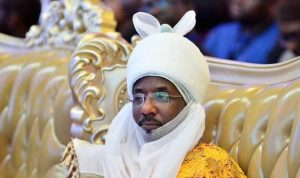
Sanusi Lamido Sanusi Banking
Sanusi began his banking career in 1985, when he was engaged as a merchant banker by Icon Limited (a subsidiary of Barings Bank and Morgan Guaranty Trust), eventually rising to the position of head of financial services and manager of the Kano office.
He left the bank in 1991 to study Arabic and Islamic studies at the International University of Africa in Khartoum, Sudan.
President Umaru Musa Yar’Adua nominated Sanusi as Governor of Nigeria’s Central Bank on June 1, 2009; his appointment was ratified by the Nigerian Senate on June 3, 2009, during the global financial crisis.
The crisis hurt Nigeria’s economy and banking sector, causing the stock market to collapse by about 70%.
During the crisis, Sanusi led the central bank in rescuing top-tier banks with over ₦600 billion in public funds, firing and imprisoning CEOs who misused consumer savings, and sternly dealing with banks found liable for financial crimes.
Sanusi ascribed the capital market crisis to “financial illiteracy” among Nigerian investors.
He also implemented a consolidation process that reduced the number of Nigerian banks through mergers and acquisitions to make them stronger and more accountable to depositors.
He also led initiatives to increase infrastructure investment and support for small and medium-sized firms.
During Sanusi’s reign, some substantial banking reforms known as the “Sanusi Tsunami” were implemented.
The reforms were constructed around four pillars: improving the quality of banks, establishing financial stability, allowing for healthy financial sector evolution, and ensuring the financial sector contributes to the real economy.
Sanusi developed the cashless policy, in which financial transactions are conducted without the use of physical banknotes or coins, but rather through the transfer of digital information (usually an electronic representation of money) between the parties involved; he also introduced and supported the establishment of Islamic banking in Nigeria, which was criticized by the Christian Association of Nigeria.
He also argued with the National Assembly over its budgetary spending of 25% of total government revenue and opposed the International Monetary Fund’s demand for a currency depreciation.
He also advised the administration on the abolition of the fuel subsidy, which he claimed promoted a culture of high-level corruption and economic inefficiencies.
– The elimination of the subsidy was unpopular and led to the Occupy Nigeria campaign, which demanded his resignation.
The industry reacted both negatively and positively to his measures. The Banker magazine named him the 2010 Central Bank Governor of the Year for his reforms and for spearheading a dramatic anti-corruption effort in the industry, the first of its type since the financial crisis.
Sanusi is well-known for calming the overtly corrupt banking business and promoting a risk-management culture in Nigerian banking. Sanusi has spoken at several international events, including the 2013 World Economic Forum.
In December 2013, in a leaked letter to President Goodluck Jonathan, Sanusi stated that the Nigeria National Petroleum Corporation (NNPC) failed to return US$48.9 billion of government oil earnings to the central bank.
– The NNPC has a history of financial irregularities and manages Nigeria’s crooked petroleum industry.
President Goodluck Jonathan removed Sanusi as Governor of the Central Bank of Nigeria in February 2014, following a series of public investigations and raising concerns about the US$20 billion NNPC scam.
In April 2014, he won a court lawsuit against the federal government, after being imprisoned and having his foreign passport confiscated by the State Security Service.
Sanusi Lamido Sanusi Interregnum
On June 6, 2014, Emir Ado Bayero, who had reigned as Emir of Kano for nearly five decades, died, sparking a succession issue within the royal family.
On June 8, 2014, Sanusi, the grandson of former Emir Muhammadu Sanusi I and holder of the traditional title of Dan Majen Kano (Son of Emir-Maje), was proclaimed the next Emir of Kano.
His succession sparked significant protests from supporters of Sanusi Ado Bayero, the Chiroman Kano (Crown Prince) and son of the late Emir Ado Bayero, who claimed that Governor Rabiu Kwankwaso interfered with the king-making process.
Sanusi Lamido Sanusi Rign
On June 8, 2014, Sanusi was chosen to succeed his grandfather, Ado Bayero, as Emir of Kano. His enthronement was contentious, with some suggesting it was a politically driven ploy to dodge corruption charges stemming from his time at the central bank.
Many people expected Bayero’s son to succeed him as The Emir and opposed Sanusi’s selection.
On June 9, 2014, he was crowned Sarki Muhammadu Sunusi II (anglicized as Sanusi), the fifty-seventh monarch of the ancient city Kano; hierarchically, the fourth-most significant Islamic traditional ruler in Nigeria, behind the Sultan of Sokoto, Shehu of Borno, and Emir of Gwandu.
In November 2014, after Sanusi urged his supporters to resist Boko Haram, the Great Mosque of Kano was bombed, killing over 150 people.
In December 2014, Boko Haram commander Abubakar Shekau accused Sanusi of deviating from Islam and threatened to kill him.
Sanusi responded that he is “safe with Allah” and compared Shekau’s radical remarks (describing Sufis as infidels) to those of the heretical Islamic preacher Maitatsine.
During Sanusi’s six-year reign, the Emir rebuilt himself as a captivating figure at the intersection of tradition and modernity.
Major developments included the drafting of a new Muslim family law, the construction of a 40,000-book library, and the vernacular remodeling of the 15th-century palace. The Durbar celebration was also promoted abroad.
Tourism to heritage sites like as the ancient Dala Hill and Gidan Makama surged, which Sanusi supported.
The Emir also had a part in refurbishing the ancient city’s cultural goods, notably apparel, where he lobbied for the revival of the moribund 14th-century dye pits at Kofar Mata, and through his style and drapery displayed the craftsmanship of the city’s leading guilds.
Sanusi also criticized government policy, breaking with royal custom. He criticized the government’s misdirected priorities.
In 2017, the Emirate Council was investigated for financial issues. Many interpreted this as retaliation for comments he made against the state administration.
Following the ruling class’s intervention, the state legislature called off the probe.
In 2019, Governor Abdullahi Umar Ganduje established four new emirates: Bichi, Rano, Gaya, and Karaye. This exceptional action resulted in the division of Sanusi’s traditional realm as Emir.
According to the law, Sanusi, as Emir of Kano, will preside over only 10 of the state’s 44 local government districts, with the rest divided among the new emirates.
In March 2020, the state legislature initiated a new investigation into The Emir for violating “traditional practices”, following a high court order halting the corruption investigation against Sanusi.
Sanusi Lamido Sanusi Dethronement and Reinstatement
Governor Abdullahi Ganduje dethroned Sanusi on March 9, 2020. When Sanusi learned of his departure, he was in his private residence in Gidan Rumfa. While he waited for state officials to formally serve him with the deposition letter, a contingent of police, military, and security operatives stormed the palace.
Sanusi later acknowledged his dethronement as a divine act, urging his supporters to remain calm and avoid violence.
He also asked people to proclaim bay’ah to his successor, Aminu Ado Bayero, and remarked “It is a thing of pride that made us rule and end in the same fashion as the Khalifa,” about his grandfather Muhammadu Sanusi I, who was similarly ousted and exiled in 1963.
Sanusi later learned about his deportation from Kano to Nasarawa State. Initially wanting to serve his exile in Lagos with his family, his request was denied, and he was later led out of the palace under heavy guard to a military aviation base.
His lawyers later indicated that they intend to fight his arbitrary banishment in court. Sanusi was then transported to Abuja before being sent to Loko, Nassarawa.
On March 10, he was flown from Loko by police helicopter to Awe, a rural local government unit in the state.
On 13 March, a Federal High Court in Abuja granted Sanusi’s release, and he immediately departed Awe with Governor Nasir El Rufai, after leading Friday prayers in full regalia to Lagos.
Sanusi has said that he will not challenge his dethronement and will continue his activities as a private citizen.
He has ruled out entering politics and is devoting his time to writing and intellectual endeavors.
He is a visiting scholar at the University of Oxford’s African Studies Centre, where he plans to publish a book about his time as central bank governor during the global financial crisis.
He also aims to write about Muslim law and cultural practices in northern Nigeria. In June 2021, Sanusi published a compilation of his articles from 1999 to 2005.
On May 10, 2021, Sanusi was appointed as the leader (khalifa) of the Tijaniyyah Sufi order in Nigeria, a position formerly held by his grandfather and with enormous religious authority throughout West Africa.
He is currently doing his PhD in Islamic law at the University of London.
On March 23, 2024, the Governor of Kano State reinstated Sanusi Lamido Sanusi, who had taken the name Muhammadu Sanusi II after becoming Emire of Kano.
Sanusi was overthrown as Emir of Kano four years ago.
Governor Abba Kabir Yusuf of Kano State announced the decision to reinstate Sanusi to the throne by signing the Kano State Emirate Council (Repeal) Bill 2024 into law.
The new law replaces the Kano State Emirates Council Law of 2019 and eliminates the five emirate councils established by former Governor Abdullahi Umar Ganduje, which split the Kano Emirate and led to Sanusi’s dismissal.
Sanusi Lamido Sanusi Views
As a public intellectual, Sanusi has written on a variety of issues, including Islam and political economy. He has debated and written several articles that express his opinions on
Sanusi Lamido Sanusi Islam
Sanusi’s perspective is based on two underlying themes: Islam is concerned with justice and should not be used to advance personal political goals, and Wahhabist fundamentalists’ violent persecution of Sufi organizations undermines true Muslim values.
He wrote about women’s roles in society in his article, Shariah and the Woman Question. He has also expressed his thoughts about non-Muslims.
Sanusi has joined the dominant position that zakat is an instrument for transferring income, arguing in favor of delegating redistribution to the government.
Sanusi has also called for family planning to address almajiranci. He has advocated for an end to child marriage, women’s empowerment, and the use of mosques for education.
He believes that polygamy is causing poverty in the region and favors population planning.
He has also defended his views on Islam in Africa and has spoken out against outsider influences on the continent’s religious life, stating that “Wahhabism and Salafism share a certain intolerance with groups such as Boko Haram.
Islam in Africa has its schools of thought, historic civilizations, and history. And we don’t need Saudi Arabia or Iran to explain Islam to us.
Sanusi Lamido Sanusi Culture
Sanusi has advocated for a cultural resurgence in northern Nigeria. In his works, he has expressed his opinions on Hausa-Fulani cultural hegemony and is an advocate for Nigeria’s unity in diversity.
Sanusi has opposed postcolonialism and the use of English as an official language, noting that in Kano, Arabic was the official language for 600-700 years.
After 60 years of British rule, English is now Nigeria’s official language. Arabic is not the official language.”
He has also advocated for the revival of Trans-Saharan trade, noting that “The Sahel was an important element of global business; it served as a transit point for goods from Asia to the Atlantic and Europe.
Timbuktu, Gao, Kano, and Agadez were Africa’s richest cities before the steamship and colonialism. Many Sahelian countries are part of a major Arab Islamic civilization, with Arabic serving as the official language of communication.
Sanusi Lamido Sanusi Politics
Sanusi argues that fundamental constitutional adjustments are necessary to overcome misgovernance in Nigeria.
He has questioned Nigeria’s unusually high cost of governance and is opposed to a full-time bicameral legislature, 36 states with governors and deputies, and thousands of government assistants.
He has also advocated for an overhaul of the Nigerian Civil Service, calling it inefficient and overburdened.
Sanusi has refused to participate in Nigerian politics or pursue political office since 2013, declaring in a BBC HARDTalk interview that “I cannot survive in Nigerian politics”.
He has stated that “our duty as Muslims is to learn from the ideals of Muhammad to save the society from the eminent danger that is facing it” in response to the negative impact of unprincipled politics on society.
Sanusi Lamido Sanusi Economy
Sanusi wants major economic structural reforms and a more “interventionist, directional economic policy” for Nigeria.
He has also advocated for economic diversification away from oil and criticized financialization for producing a “fake economy” with insufficient impact on the real economy.
He has also advocated for the employment of state-owned banks and development finance to promote industrialization.
When it comes to bank ownership, he believes that “The owners and managers of banks, the rich borrowers and their clients in the political establishment are the same class of people protecting their interest, and trampling underneath their feet the interest of the poor with impunity”.
In his introduction of Islamic banking to Nigeria, he elaborated his view that Islamic finance is a resilient alternative; stating “Islamic banking, if well harnessed, would ensure large numbers of people are economically independent.”
He also noted in the past proponents of interest-free banking included Aristotle, Adam Smith, and Alfred Marshall.
Sanusi Lamido Sanusi Corruption
As governor of the central bank, he launched a radical anti-corruption effort, removing Cecilia Ibru and other influential bank executives for mismanaging consumer deposits and imprisoning two senior bankers.
According to Sanusi, there was no choice but to target the powerful and interconnected vested interests that were manipulating the financial system.
Sanusi has spoken out against the fuel subsidy, citing the high level of corruption and the inefficiency of subsidizing consumption instead of production (leading to slower economic growth), as well as the fact that the government borrows money to finance the subsidy—taxing future generations so that present Nigerians can consume more fuel.
Sanusi said that during the Jonathan administration, Nigeria lost a billion dollars every month due to cash diversion.
According to American and British officials, former petroleum minister Diezani Alison-Madueke may have diverted $6 billion (₦1.2 trillion) from Nigeria’s treasury.
According to Alison-Madueke, Sanusi made the charges in response to her rejection to designate him as President of the African Development Bank, which Sanusi rejected.
In 2015, Alison Madueke was detained in London.
Sanusi has criticized Buhari’s anti-corruption fight, claiming that his administration’s foreign currency strategy creates a nouveau riche class and promotes the rentier economy.
Sanusi Lamido Sanusi Activities
Sanusi’s personal, humanitarian, and academic pursuits include:
- PhD in Islamic Law, University of London.
- Academic Visitor, University of Oxford, African Studies Centre, Oxford School of Global and Area Studies.
- United Nations [128] Advocate for the Sustainable Development Goals.
- Chairman of Babban Gona, a private agricultural program that assists rural farmers.
- Chairman of Black Rhino, a Sub-Saharan Africa infrastructure fund of The Blackstone Group.
- Chairman of the Advisory Board of 1 Million Teachers, a non-governmental educational organization.
- Independent Non-Executive Director at MTN Group.
- Vice Chairman of the Kaduna Investment Promotion Agency.
- Chancellor of Kaduna State University.
Sanusi Lamido Sanusi overseas visits
Sanusi has spoken at several international events, including the 2013 World Economic Forum.
As Emir of Kano, he traveled widely, including a visit to the Svalbard seed vault with a United Nations group.
In August 2023, during the situation following Niger’s coup d’état, he traveled to Niamey to arbitrate with the putschists, where he met Abdourahamane Tchiani.
He announces that he intends to convey a message to Nigerian President Bola Tinubu, with whom he has a good friendship. However, he claims not to act as a “government emissary”.
Sanusi Lamido Sanusi Honors
Commander in the Order of the Niger
In 2010, The Banker named him the 2010 Central Bank Governor of the Year (globally) and the Central Bank Governor of the Year for Africa.
In 2011, Time magazine named him one of the 100 most influential people of 2011.
In 2013, Sanusi was honored at the third Global Islamic Finance Awards (GIFA) in Dubai for his advocacy in advancing Islamic banking and finance during his stint as Governor of the Central Bank of Nigeria.
Sanusi became the seventh Global Leadership in Islamic Finance Award recipient in 2015, following Tun Abdullah Badawi (2011), Sultan Nazrin Shah (2012), Shaukat Aziz (2013), and Nursultan Nazarbayev (2014).
Sanusi was awarded an honorary doctorate from Nigeria’s Nile University in 2018.
In 2019, Sanusi got an honorary doctorate from the SOAS University of London.
Sanusi Lamido Sanusi Issue
Sanusi has four spouses and thirteen children—five sons and nine daughters.
Sanusi Lamido Sanusi Writings
For the Good of the Nation: an outline of Muhammadu Sanusi II’s opinion on the best way for Nigeria.
Muhammadu Sanusi II has produced several essays on social problems (the family and women), political subjects (globalization), legal issues (Islamic law and constitutionalism), historical topics (the Fulani in History), and several works on political economy.
Sanusi Lamido Sanusi Social Media
Who is Muhammad Sanusi II?
His Highness (HH) Muhammad Sanusi II is the 14th Emir of Kano and Khalifa of the Tijjaniya clan in Nigeria. Before coming to the throne, HH served as Governor of the Central Bank of Nigeria. He also served as the Chief Risk Officer and Group CEO of First Bank of Nigeria Plc.
When did Sanusi become the Emir of Kano?
Emir Muhammadu Sanusi II took power on June 8, 2014, and came back to his seat on May 23 2024 when Rabiu Kwankwaso was governor of Kano State. He was made Emir less than four months after Goodluck Jonathan, the president at that time, ousted him as Governor of the Central Bank of Nigeria.
What is Sanusi Lamido Sanusi’s educational background?
Sanusi Lamido Sanusi is with the World Economic Forum. Ahmadu Bello University, Zaria, earned a BSc and an MSc in Economics in 1981 and 1983, respectively; African International University, Sudan, awarded a degree in Sharia and Islamic Studies in 1997. 1983: Lecturer in Economics, Ahmadu Bello University, Zaria.
What qualifications does Sanusi hold?
Ahmadu Bello University in Zaria. 1967–1972: Master of Science in Economics. Sanusi combines a finance job with a solid academic background.
St. Anne Primary School, Kakuri, 1967–1972. Master of Science in Economics 1967–1972: Master of Science in Economics.
What happened to Sanusi?
Sanusi, 49, is accused of disrespecting the Selangor Sultan. He was controversially arrested on July 18 at 3 a.m. at a hotel in Kuala Lumpur, before being accused in court of sedition.
Discover more from Labaran Yau
Subscribe to get the latest posts sent to your email.

